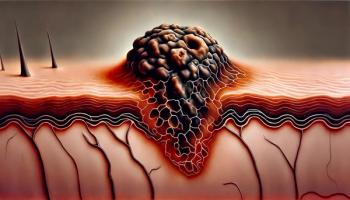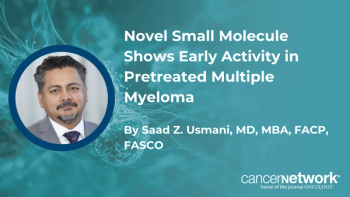
- ONCOLOGY Vol 10 No 10
- Volume 10
- Issue 10
Nursing Challenges of Caring for Patients with HIV-Related Malignancies
The Moran article presents an excellent summary of the malignancies associated with HIV. The diagnosis of an HIV-related malignancy places additional stress on an already compromised immune system. Neoplasms arising in AIDS patients tend to be aggressive, and because of the immunocompromised state of these patients, they are unable to tolerate the side effects of the various modalities used in treatment.
The Moran article presents an excellent summary of the malignanciesassociated with HIV. The diagnosis of an HIV-related malignancyplaces additional stress on an already compromised immune system.Neoplasms arising in AIDS patients tend to be aggressive, andbecause of the immunocompromised state of these patients, theyare unable to tolerate the side effects of the various modalitiesused in treatment.
The strategy for treating AIDS and cancer is threefold. Health-careprofessionals must treat the cancers associated with HIV whiletrying to maintain or reconstitute a weakened immune system anddeal with the physical, psychological, and social issues associatedwith these diseases. Nursing plays a vital role in the assessmentand management of patients with the dual diagnosis of AIDS andcancer.
Each AIDS-related malignancy poses its own unique challenges fornursing management. Nurses must attend to the physical, psychological,and social needs of their patients. Treatments for neoplasms associatedwith AIDS cause an already compromised immune system to be taxedfurther. Also, these therapies often cause an increased incidenceof opportunistic infections. These opportunistic infections arephysically and psychologically difficult for the patient to tolerate.The medications used to treat these complications often causeadditional symptoms that are difficult to control. Nurses mustbe flexible and innovative when caring for these patients, alteringtheir approach based on individual patient's needs.
Lymphomas
Since non-Hodgkin's lymphoma (NHL) is an aggressive malignancyand AIDS is a disease characterized by multiple problems, thiscombination is particularly challenging to manage (Table 1). Currentefforts at treating AIDS-related lymphomas are designed to aggressivelytreat the underlying disease and ameliorate the myelosuppressionassociated with extensive chemotherapy. Chemotherapy administeredto AIDS patients can severely test an already compromised immunesystem and provide increased opportunity for opportunistic infectionsto develop.
The response of AIDS-associated NHL to standard chemotherapy regimesis poorer than those seen in non-AIDS lymphomas. A complete responseoccurs in approximately 50% of all patients. These complete responsestend to be of relatively short duration, with relapses into thecentral nervous system (CNS) frequently. Median survival is approximately6 to 8 months.
A history of opportunistic infections, especially Pneumocystiscarinii pneumonia (PCP), is a poor prognostic indicator. Opportunisticinfections are a common cause of death in patients receiving therapy.
Treatment includes aggressive chemotherapy regimens, with prophlacticchemotherapy administered intrathecally to prevent relapse ofthe lymphoma into the CNS. Concurrent prophylaxis against PCPis also administered. Granulocyte-macrophage colony stimulatingfactor (GMCSF) (molgramostim [Leucomax], sargramostim [Leukine,Prokine]) or granulocyte colony stimulating factor (GCSF) [Neupogen]is given to decrease the patient's neutropenic period and to reducethe incidence of opportunistic infections. Antiretroviral therapyis given concurrently as well.
A major factor limiting the use of chemotherapy in AIDS-relatedNHL is hematologic toxicities or bone marrow suppression. Thisis a particular problem in patients who have depleted marrow reservesfrom long-term zidovudine (Retrovir) therapy (see Table 1).
Tumor Lysis Syndrome--Non-Hodgkin's lymphoma is associatedwith rapid tumor proliferation, a large tumor burden, and acutesensitivity to chemotherapy agents. These three factors placethe patient at risk for the tumor lysis syndrome. In this syndrome,the necrotized tumor releases its intracellular contents intothe circulatory system. Metabolic abnormalties can be severe andlethal. They include hyperkalemia, hyperuricemia, hyperphosphatemia,hypocalcemia, and xan- thinuria. The clearance of the productsof tumor lysis depend on hepatic metabolism, the extent of thepatient's renal dysfunction, and the process of phagocytosis.Patients at greatest risk have the predisposing condition of renalinsufficiency and/or a large tumor burden.
Nursing case of the patient with AIDS-related NHL involvesthe administration of intensive medical therapies and the provisionof complex, innovative physical care. Consistent attention andsupport must also be focused on the psychosocial, ethical, andspiritual needs of the patient. Patients need assistance in dealingwith the complexity of two life-threatening disease processesand in coming to terms with their probable death. Nurses playan important role in advocating for the patient with the health-careteam, the family, and friends, and helping the patient addressthe issue of advance directives.
Kaposi's Sarcoma
Kaposi's sarcoma (KS) is a multifocal disease that ranges fromcutaneous lesions to disseminated disease involving the internalorgans. The physical appearance of someone affected by KS hascaused some persons to equate it with wearing a scarlet letter.This perception causes persons with HIV to be fearful of any lesionthat appears and to become reclusive if the KS is visible.
Nurses can discuss KS with their patients and talk about the optionsthat patients have to cope with the skin lesions. These includeusing make-up, altering their style of dressing, and joining asupport group to learn other ways persons have found to cope.
The nurse needs to take a holistic approach to treating patientswith KS. These patients have complex physical and psychosocialneeds, which require time and creative solutions. The most importantthing that a nurse can do is acknowledge patients' lesions. Touchingpatients and talking with them will make them feel less aloneand isolated. Laughter and compassion are important tools to helpthe patient continue to be a part of their social environment.Giving a patient a make-up lesson or arranging for a friend toassist in purchasing clothes that will hide the lesions can makea significant difference.
Also, health-care professionals can play an important role inadvocating for and addressing the ethical needs of these patients.Nurses are in an excellent position to explore their patients'feelings, values, and knowlege concerning quality of life andmedical interventions in the face of health, chronic illness,or irreversible disease. Discussing quality-of-life issues withpatients ultimately promotes patient autonomy.
Invasive Squamous Cell Cervical Carcinoma
Invasive squamous cell carcinoma of the cervix has begun to bestudied in several clinical trials, which should lead to new knowledgeabout the disease. Women are beginning to be studied to determinethe effects of the HIV virus on their systems.
The impact of cancer and AIDS on women and their families hassignificant ethical and legal ramifications. A large proportionof women with AIDS and cancer have families to care for. The childrenmay or may not be HIV-positive, and arranging care for them whilethe mother is ill and after she dies is a critical issue--onethat is just being faced by many families.
Nurses can assist their patients by allowing them to talk abouttheir fears and concerns. They can also direct patients and familiesto family services that can help them make these difficult decisions.
It is imperative that women receive appropriate care for themselves,as well as provide care for their families. Nurses must work withthe health-care team to help these women find the resources toassist them in obtaining care. Services should be identified byall members of the health-care team. Prior planning for patientreferrals is essential to optimize care.
Summary
The Moran article provides a thorough look at the cancers associatedwith AIDS. In addition to providing medical care, health-careprofessionals must address the psychosocial and legal ramificationsof these diseases in order to provide holistic care to their patients.
Suggested Readings
Baird SB: Decision Making in Oncology Nursing. Toronto, Decker,1988.
Brown MH: Standards of Oncology Nursing Practice, New York, JohnWiley, 1991.
Chase M: Increasing incidence of a lymph cancer seen among long-termAIDS survivors. Wall Street Journal, June 11, 1990.
Devita V: AIDS, 2nd ed. Philadelphia, JB Lippincott, 1991.
Dorr RT: Cancer Chemotherapy Handbook. New York, Elsevier, 1980.
Knowles DM: Lymphoid neoplasia associated with the acquired immunodeficiencysyndrome (AIDS). Ann Intern Med 108:744-753, 1988.
Oncology: Programmed Modules for Nurses. Types of Cancer, vol3, no. 6. New York, LP Communications, 1990.
Pluda JT: Development of non-Hodgkin lymphoma in a cohort of patientswith severe human immunodeficiency virus (HIV) infection on long-termantiretroviral therapy. Ann Intern Med 113:276-282, 1990.
Pluda JT: The occurrence of opportunistic non-Hodgkin's lymphomasin the setting of infection with the human immunodeficiency virus.Ann Intern Med 2(suppl 2):191-200, 1991.
Wittes RE: Oncologic Therapeutics. Philadelphia, JB Lippincott,1989/1990.
Articles in this issue
over 29 years ago
Cigarette Smoking Among Adults--United States, 1994over 29 years ago
New Clues To Cancer Growth Discoveredover 29 years ago
Survey Results: Kicking the Habit Tough for US Tobacco Farmersover 29 years ago
Possible New Approach to Preventing Chemotherapy Drug Resistanceover 29 years ago
Genetic Tests Further Complicate Ovarian Cancer ControversiesNewsletter
Stay up to date on recent advances in the multidisciplinary approach to cancer.












































